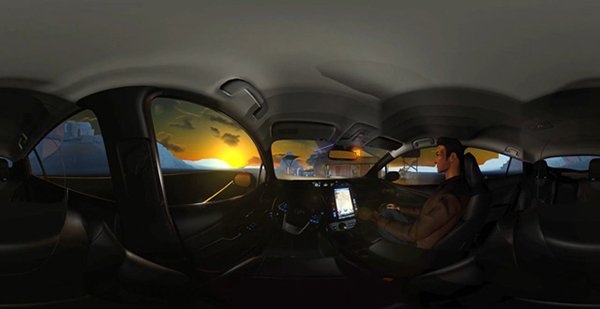When people come into contact with VR for the first time, a fun thing happens. They will be stunned and begin to excitement to shout their thoughts on VR. They are just like speakers, and they describe you to the future with emotion. For sports fans, VR allows you to sit in the "side position" to watch the NBA Finals. As for gamers, VR can finally let you step into that world.

Face the devil
Although we are very vague about the future of VR, this future also scares me.
"I just saw the devil."
This is the first sentence my friend said after taking off Vive’s head. This friend is not a Luddite (a person who opposes new technology). She is a game player. In fact, she told me that she used to indulge in a massively multiplayer role-playing online game and stayed in the virtual world for a long time.
She predicts: "This will swallow the entire people and will never let them go."
Virtual reality will essentially "occupy" us because it will suck us into another world. When you create a movie or a song, you capture the sensory experience of the audience. But when you create a VR, you isolate the user from the real world and send them to the universe that you created entirely.
As Uncle Peter Parker said in Spiderman, the greater the ability, the greater the responsibility.
2. Has great power
Virtual reality is also like a double-edged sword, which can bring about positive changes as well as hidden concerns. The Internet age has taught us this.
The company will create an empty virtual reality Skinner box that will suck us in and keep us from leaving. The terrorists and hate groups will create realistic simulations, showing that their worst predictions are becoming a reality. (Note: Skinner's Box is an experimental device designed by Skinner to study operational conditioned reflexes. One of the founders of the new behaviorist psychology believes that all human behavior is almost the result of operational reinforcement; Psychology shows that conditional reflexes are related to voluntary behavior)
Even well-meaning works will eventually be distorted, and we need to be more explicit in designing our VR experience and be more attentive.
Virtual reality is an amazing technology. I sincerely hope that VR can make our lives more happier, smarter, and more able to connect with each other. This article is not intended as a prediction of darkness and misfortune, but is about thinking about the positive and negative effects of VR use cases and trying to make it play a more active role.
For the following three questions, VR creators will be forced to make choices:
Do you want your content to create a relationship of empathy and humanity, or do you want to spread hatred and fear?
Can your content provide users with useful information and unique experiences, or do you just want to earn their money and steal their data?
Is your game designed to provide users with a fun and engaging experience, or is it that you are using human psychological loopholes to indulge users?
Interestingly, these three areas can be broadly divided into different ways of using VR and the choices that specific experience creators must make.

3. Empathy vs fear: VR narrative and documentary
On the bright side: Let us establish connections with other people. With the help of VR's presence, we can profoundly understand others.
The bad side: hatred and fear information will become extremely powerful in VR. Imagine the simulation of a terrorist attack through the presence of virtual reality before voting in war-torn areas to choose whether or not to build a mosque. Using VR's power to control fear and paranoia is much easier than other disciplines.
The ugly side: We cannot avoid the bad stories in VR. There are always experiences that are unpleasant or uneasy. The specific boundaries will be defined by content creators and individuals.
Bottom line: VR storytelling is a powerful tool. Like other media, creators should be careful about what they are creating. A stronger medium does not mean that we should shrink or suppress ourselves, but we do need to think about potential possibilities.

4. Give vs Use: VR Marketing and Professional/Education Applications
On the bright side: VR can deliver rich and powerful experiences that allow companies to create value for their potential customers.
On the bad side: VR marketing and sales staff can use our inherent insecurity and concerns to drive us to make stupid purchase decisions.
The ugly side: Our data may be stolen, bought, and sold. This may not cause any problem to some extent. However, consumers need better protection from personal data abuse.
Bottom line: In 5-10 years, we will make most purchase decisions through VR/AR. If you want to make use of only one point, focus on bringing value to consumers instead of taking advantage of consumer insecurity.

5. Entertainment vs Slavery: Games
On the bright side: VR games will be very interesting, engaging, and in-depth. The game itself is already a very attractive art, and VR will significantly enhance their importance in popular culture and in our daily lives.
The bad side: It's easy to develop apathy and emptiness games that attract users by exploiting holes in brain psychology called Skinner boxes. These games are easy to attract users and can be described as hand-to-hand. In VR, these Skinner boxes can be packaged as a visual feast for the eyes, as well as the brains of the heroin, but in reality there is no gameplay, no story, no fun, and no value at all.
The ugly side: Some of the games are just for money, but the same mechanism can be used to bring about more positive effects.
Bottom line: Does your creation make people's lives more interesting? Or are you just trying to circulate money? The mobile gaming industry has faced such a dilemma. For VR, this is a more pressing issue.
Just as mobile devices have subverted all aspects of our lives in the past 10 years, we believe that virtual reality and augmented reality will be the same. VR will reshape the way we learn, play, socialize, and shop.
The above questions are not easy to answer. Things we need to consider include artistic freedom, acceptable business practices, and factors that make the experience valuable. This is a question that VR developers, storytellers, investors, and consumers must answer together.
We need to be aware that technology and the media have a huge impact on our stories, businesses and games, and we think about the subtle choices we make because these choices will define the systems we shape. ?
Apple Headset Wireless Charger
Qi Certified Charger,Apple Wireless Charger,Apple Watch And Phone Charger,Apple Headset Wireless Charger
wzc , https://www.dg-wzc.com